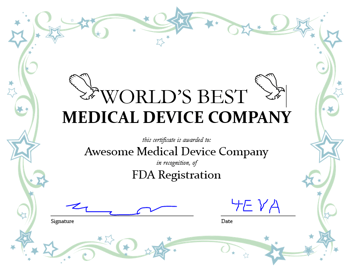In December 2021, RQM+ acquired AcKnowledge Regulatory Strategies (AcKnowledge RS), a San Diego-based firm specializing in regulatory affairs consulting for the medical device and IVD industry. The integration of this impressive team enhances the extensive RQM+ network of current and former FDA reviewers, scientists, engineers and regulatory and quality experts, and adds additional expertise with FDA submissions. The author of this post is a member of this team, which has done significant work with novel and/or high-risk devices focusing on pre-submissions, 510(k)s, IDEs, PMAs, De Novos, Breakthrough Designation Requests and Safer Technology Program Requests.

Happy Friday, regulatory fans! Today, we are talking about FDA registration.
We are going to discuss what registration means for companies selling medical devices, along with whether having a registration certificate means a medical device has been FDA cleared, approved or otherwise authorized for sale on the U.S. market. (Spoiler alert…it absolutely does NOT!)
We decided to shed additional light on registration after FDA issued a press release warning the public about false and misleading registration certificates. For years, but even more so as a result of the ongoing COVID-19 pandemic, an unfortunate number of companies have used or are using registration certificates to claim that the devices they produce or distribute have been reviewed by FDA and authorized for sale. From personal protective equipment (PPE) to COVID tests, it is imperative that the public understand what companies can claim and when, as well as understand what it means to be “FDA Certified” (hint: absolutely nothing) or “FDA Registered” (not exactly nothing, but not much). Let’s dive in.
Let’s start with registration and what it means to be “FDA Registered”. Every year, an establishment that intends to produce and/or distribute a medical device for use in the U.S. is required to register with FDA. So, all registration means is that the company has informed FDA of their existance and listed the devices that they are planning to produce and/or distribute. FDA registration does not mean the medical device has been reviewed by FDA and cleared, approved or authorized for sale on the U.S. market. Ok, to be fair, registration doesn't mean the medical device hasn’t been reviewed by FDA, but a reviewed and authorized medical device will probably be marketed as “FDA cleared” or “FDA approved”. The point is, all regulated medical devices must be registered, and registration simply means FDA has been made aware of the medical device manufacturer or distributor’s intent to produce and/or distribute a medical device during the year.
The FDA’s review of medical devices ensures that devices on the U.S. market are safe and effective (or at least substantially equivalent to a safe and effective device). Because the process can take time and money, some companies knowingly (or perhaps unwittingly) register with FDA and start to sell their moderate to high risk product directly. For a fee ($5,526, FY 2021), any company can register and list with FDA. For very few companies is registration the only hurdle to go ahead and sell their device on the U.S. market (ahem, got a Quality System?) Sadly, there has been an increase in medical device companies displaying official-looking certificates on their website, claiming to be “FDA Registered” like FDA gave them a stamp-of-approval. The truth is, FDA does not issue fancy registration certificates to anyone, no matter how cool their device is!
As stated on the FDA website, “FDA does not issue Registration Certificates to medical device establishments. FDA does not certify registration and listing information for firms that have registered and listed. Registration and Listing does not denote approval or clearance of a firm or their devices.” Now, it is possible these companies are trying to say, “Hey, we’re going through the FDA review process right now, and we’re really excited about it,” or, “Our company is listed on the FDA website!” Either way, a registration certificate can be highly misleading and one should be wary of any such official looking documentation. What it boils down to is that registration alone is not synonymous with clearance, approval or authorization, and that FDA has not necessarily determined the device to be safe and effective. In their statement earlier this month, FDA asked for all companies claiming to be “FDA Registered” to take down all such claims, including any misleading certificates and statements.
So what’s the lesson here? Always be accurate and honest when making any claims, and when combing the internet and looking at all of the amazing medical devices out there, be an informed consumer and double check a company’s claims before you buy. If you have any questions about whether or not a device has been approved or cleared by FDA, you can always check online via the FDA’s website! Stay safe everyone!
Further Reading:


